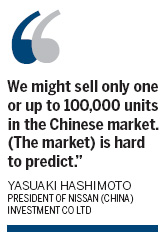Business
Nissan sees hazy market for electric cars
By Wang Chao (China Daily)
Updated: 2010-12-15 11:05
 |
Large Medium Small |

BEIJING - A surge in all-electric vehicles is expected to hit select markets around the world, but at least one auto executive thinks China isn't ready to be plugged in.
Yasuaki Hashimoto, president of Nissan (China) Investment Co Ltd, said if China does not create a national infrastructure standard for electric vehicles as soon as possible, the nation with the world's largest car market will fall behind in the development of electric cars.
"It would be a disaster for our customers if Beijing is using one (charging station) standard while Shanghai uses another," he said, adding that China is "the most difficult market".
"We might sell only one or up to 100,000 units in the Chinese market. (The market) is hard to predict," he said.
Hashimoto's comments come right as Nissan rolls its all-electric Leaf vehicle. It is the world's first mass-produced, battery-powered electric car.
While he said China has massive potential in the electric vehicle market, the company will not manufacture the Leaf in China in the next year or two because of the lack of charging station standard.
Based on a proposal by Nissan's Chinese joint venture partner Dongfeng Nissan, the Leaf will be imported to China to be sold in 2011. By 2015, the Leaf is expected to achieve sales of up to 50,000 units in China.
Next year, there will be a pilot program of 25 Leaf units in Wuhan, capital of Central China's Hunan province.
But China has been gearing up for the advent of electric vehicles for some time. The State Grid has worked on building charging stations and plans to build 75 charging stations and 6,209 charging pillars in 27 cities across the nation by the end of 2010.
Recently, China's Ministry of Industry and Information Technology issued a national charging standard but it is currently up for public comment, a critical part of the planning process.
One glaring problem in China's electric vehicle infrastructure is that some power companies are already building charging facilities on different scales. The equipment from different companies are consequently incompatible. Once a national standard goes into effect, many existing charging facilities will go through a painful revision. Shanghai has built six charging stations while Tianjin will have finished its fifth by the end of the year.
Another problem, according to Hashimoto, is that Chinese customers may hesitate before buying an electric car.
"In the United States, everybody has a garage, where they can charge their batteries, so it is not a problem to charge at home," he said. "But in China, few people have their own parking space, making it a governmental responsibility to build standardized public charge infrastructures."
In 2009, there were about 76 million vehicles in China. That total is expected to reach 450 million in 2030, according to the Ministry of Transport. The 12th Five-Year Plan (2011-2015) aims to reach an electric vehicle production capacity of 1 million by the end of 2015.
The Ministry of Science and Technology is stepping up pressure on Chinese auto companies to build electric vehicles. Though there isn't a single electric passenger car in China, there is a government subsidy of 60,000 yuan for purchases of electric vehicles, foreign or domestic.
But the buzz of the Leaf should add pressure on China's car producers. The Leaf is, according to auto industry analysts, the first in a wave of new all-electric vehicles. It has a 73-mile range and will make its Japan debut on Dec 20 at the price of 3.76 million yen ($44,820).
Nissan has installed charging equipment at all of its 2,200 domestic dealers in Japan. The company also announced it will sell the Leaf in the US and Europe by mid-December. It has received more than 20,000 orders from US customers.
Still, all is not lost in China, said Wang Binggang, an expert committee member of the Ministry of Transport.
"Most Chinese customers are still buying their first cars, when their counterparts in developing countries are already buying their second or third. So it should be easier to persuade Chinese customers to shift to electric cars from conventional ones," he said.